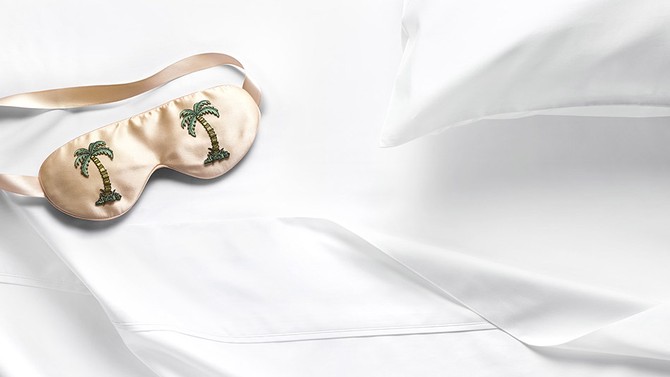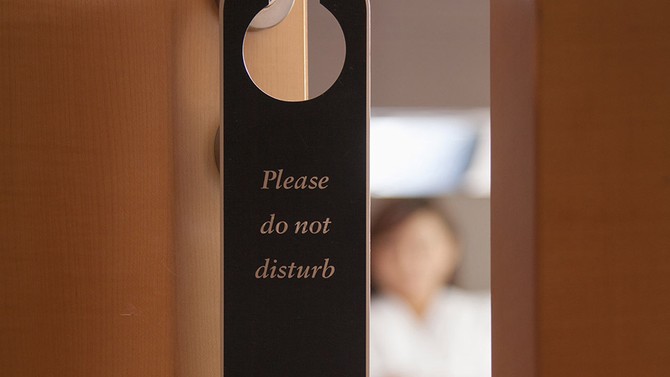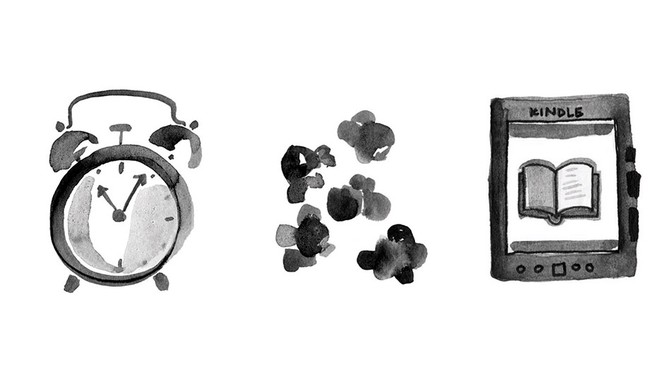How to Get Vacation Sleep At Home
You don't need to stay in a five-star hotel to achieve five-star shut-eye.
By Juno DeMelo

Photo: The Voorhes
When a friend recently told me about her upcoming trip to Mexico, I couldn't help feeling jealous. Not just because she'd be staying near Mayan ruins, but because of the incredible sleep I knew she'd be getting. Who doesn't want to sleep the sleep of the just (married and honeymooning in Tulum, Mexico)? But even if you don't have plans for a slumberific sojourn, it turns out that many of the habits we adopt on vacation can easily transfer to home. Here's how to unpack more blissful nights...

Photo: The Voorhes
Get Set Up
Steal these simple upgrades from hotels.
Temperature Control: Hotels are known for being cold, which is helpful because we tend to fall asleep faster in cool temperatures, says Holly Phillips, MD, author of The Exhaustion Breakthrough. She recommends keeping your bedroom in the 60- to 67-degree range.
Shutting Light Out: Ditch the rinky-dink blinds; hotel rooms often have blackout curtains. Light suppresses our body's production of melatonin, a hormone that helps regulate the sleep-wake cycle. Layer blackout liners behind your existing drapes, or wear a sleep mask; a study in the journal Critical Care found that subjects who used them got more REM sleep and were less likely to wake in the middle of the night.
Keeping Quiet: Car alarms and ambulance sirens are not noises you're likely to hear in a beach hut. Gopal Allada, MD, a sleep medicine specialist at Oregon Health & Science University, recommends drowning out the racket with white noise, which can be accomplished with an oscillating fan. Bonus: It'll keep your room cool and well ventilated.
Pillows, Pillows, Pillows: Hotel beds often have what seems to be an impractical number of pillows, but they can come in handy. Phillips, who, like many of her patients, has sleep apnea, dislikes using a CPAP machine (a device that pumps air through a mask you wear over your nose), preferring to prop herself up on a bunch of pillows, which helps keep her airways open. In fact, research has found that for subjects sleeping on their back, the severity of sleep apnea can fall significantly as their angle of recline increases to 45 degrees.

Photo: XiXinXing/iStock/Thinkstock
Power Down
One obvious reason you sleep so well on vacation: You don't have a care in the world. Snooze better—after your getaway—by being more mindful.
Check Your Diet: "Many people don't make the connection that when they're on vacation, they're probably not relying as much on caffeine—there's no late afternoon meeting to power through," says Cleveland Clinic wellness manager Kristin Kirkpatrick, who recommends having your last cup of coffee no later than 2 P.M. to avoid late-night jitters. And while few of us eat healthier while traveling, Kirkpatrick points out that there's usually not as much stress eating going on: You're less likely to raid the minibar for a midnight nip or feel the need to reward yourself at the end of the day with a pint of Rocky Road. Fatty foods and alcohol can trigger digestive troubles like acid reflux that can keep you up at night.
Take A Breather: "Many of us tend to think that sleep is the only type of rest we need, but fitting in 'active rest,' as one sleep specialist calls it, during your waking hours can help you at night," says Phillips. "There's social rest—spending time with people who are supportive and fun; spiritual rest, which is just contemplative thought; and physical rest, like lying on a beach or focusing on your breathing. We end up doing a lot more of these on vacation, but fitting bits of them into our day-to-day lives has been shown to stave off feelings of depletion and help our nervous system work optimally." Phillips tries to stop every hour to take a dozen deep breaths, scanning her body for areas of tension and consciously relaxing them, but you can also hold a few yoga poses, call a friend, or just sip a cup of tea.
Blur The Line: On vacation, you're far less likely to engage in anything mentally taxing before bed. The same should apply at home. "It's helpful to create a buffer zone between day and night so you can ease into sleep," says Jennifer Martin, PhD, a Los Angeles–based clinical psychologist and behavioral sleep medicine specialist. "For most people, the brain isn't a switch that you can instantly shut off." Rather than scrambling to answer a few more emails, do whatever you find relaxing for at least 30 minutes before lights-out.
Use Your Imagination: The next best thing to going on vacation may be just dreaming about it. In a University of Oxford study, people fell asleep, on average, 20 minutes sooner when they imagined a relaxing scene. Picture your last getaway or an upcoming trip and allow your mind to drift off. Sweet dreams!

Illustrations by Gillian MacLeod
Your (Surprising) Bedtime Arsenal
Tools and tips for resting easy.
Alarmy (Sleep If You Can)
Worries about oversleeping keep a lot of people up at night, says Phillips (who sets four alarm clocks for herself). This app, available for iOS and Android, makes your phone ring loudly until you take a picture of the same spot you previously photographed, like the bathroom sink or your home treadmill.
Popcorn
If you need a nighttime snack, Kirkpatrick recommends popcorn: Three air-popped cups provide about 19 grams of carbs, which can increase your body's levels of the sleep-inducing neurotransmitters tryptophan, serotonin, and melatonin—all for less than 100 calories.
Kindle
Like to read before bed? The original (and least expensive!) Kindle doesn't give off the kind of short-wavelength, blue light used in other tablet devices that, in a recent study from Brigham and Women's Hospital in Boston, was found to disrupt circadian rhythm.
From the August 2015 issue of O, The Oprah Magazine

